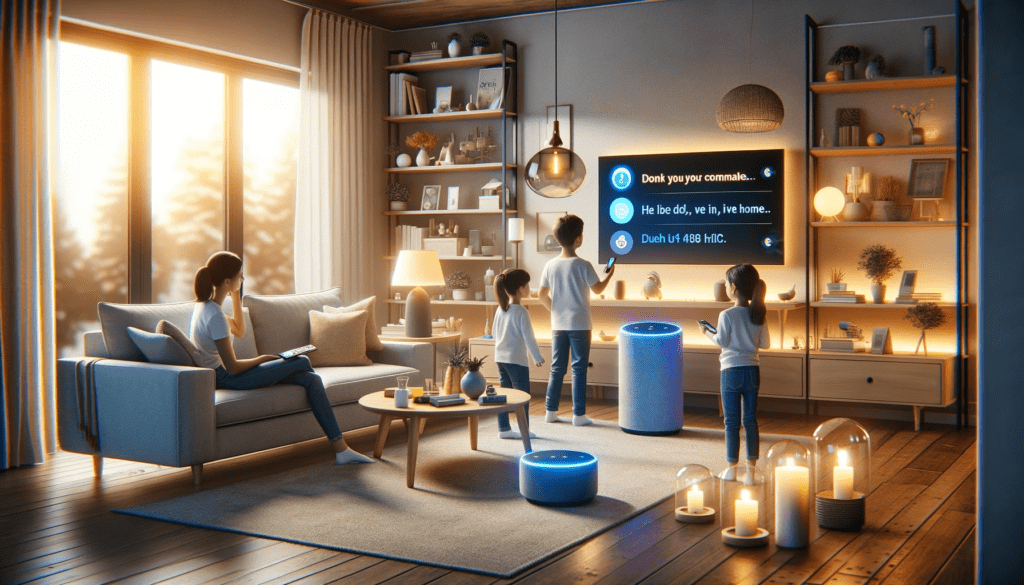The rapid advancements in Artificial Intelligence (AI) have given rise to a fascinating transformation in the way we interact with technology on a daily basis. At the forefront of this revolution are virtual personal assistants, powered by sophisticated AI algorithms, which have become an integral part of our lives. Whether it’s Siri on Apple devices, Alexa in Amazon’s Echo devices, or Google Assistant on Android devices, these AI-driven personal assistants have become household names.
The prevalence of virtual personal assistants is undeniable, with millions of users worldwide relying on them for a wide range of tasks. From answering questions and setting reminders to controlling smart home devices and even engaging in casual conversations, these AI-powered companions have seamlessly integrated themselves into our routines.
This article delves into the profound impact of AI on our daily lives and user interactions through the lens of virtual personal assistants. We will explore how AI technology has transformed these assistants from simple voice-command tools to sophisticated entities capable of understanding context and engaging in meaningful conversations. As we navigate through the various aspects of this AI-driven transformation, we aim to answer the central question: How has AI transformed daily life and user interactions through these virtual personal assistants? Join us on this journey as we uncover the remarkable ways in which AI is reshaping our relationship with technology.

The Rise of Virtual Personal Assistants
Virtual personal assistants have come a long way since their inception. Their origins can be traced back to the early days of AI research, where rudimentary chatbots and voice recognition systems paved the way for more advanced developments. However, it was in the last decade that these assistants truly began to shine.
One of the trailblazers in this field was Apple’s Siri, introduced in 2011 with the release of the iPhone 4s. Siri marked a significant leap in AI capabilities, allowing users to perform various tasks using natural language voice commands. This innovation set the stage for a new era of human-computer interaction.
Following Siri’s success, Amazon unveiled Alexa in 2014 with the Echo device, while Google introduced Google Assistant in 2016. These tech giants recognized the potential of AI-driven personal assistants and invested heavily in their development.
Today, these virtual personal assistants have become ubiquitous, extending beyond smartphones to smart speakers, smart TVs, and even cars. They have evolved from basic voice recognition tools to sophisticated AI entities capable of understanding context and providing personalized responses.
AI’s Role in Daily Life
The integration of AI-driven personal assistants into daily life is nothing short of revolutionary. These digital companions have become indispensable for countless users worldwide, simplifying a wide range of tasks and enhancing convenience.
In daily life, AI-powered personal assistants serve as versatile helpers. They assist users in setting reminders, answering queries, and managing schedules. For example, users can ask Siri to set a reminder for a meeting, inquire about the weather, or send a text message, all through natural language commands.
Moreover, these assistants have found their way into the heart of smart homes. Users can control lights, thermostats, locks, and other smart devices using voice commands. For instance, instructing Alexa to dim the lights or raise the room temperature has become a common practice, making homes more efficient and comfortable.
AI’s Impact on User Interactions
AI has ushered in a paradigm shift in user interactions with technology. Traditional user interfaces, characterized by keyboards, mice, and touchscreens, are gradually being replaced by conversational interactions facilitated by virtual personal assistants.
The convenience of conversational interactions cannot be overstated. Users no longer need to navigate complex menus or type out queries; instead, they can simply speak to their AI assistant. This accessibility has made technology more inclusive, allowing individuals with diverse abilities to interact effortlessly with devices.
Voice-activated assistants have also opened up new possibilities for multitasking and hands-free operation. Users can ask questions, make calls, and control devices while performing other tasks, enhancing productivity and efficiency.
Furthermore, AI-driven personal assistants adapt to user preferences and provide tailored responses. They learn from past interactions, making conversations more context-aware and user-centric. This level of personalization enhances the user experience and fosters a stronger connection between individuals and their digital companions.
Personalization and User Data
The effectiveness of AI personal assistants hinges on their ability to provide personalized experiences tailored to individual users. This personalization is achieved through the collection and analysis of user data. While it offers numerous benefits, it also raises important concerns regarding data privacy.
AI personal assistants, such as Siri, Alexa, and Google Assistant, rely on vast amounts of user data to understand preferences, habits, and needs. This data includes voice recordings, search history, location data, and more. By processing this information, these assistants can offer recommendations, reminders, and responses that align with a user’s preferences.
The benefits of personalization are evident in the user experience. AI personal assistants can anticipate user needs, such as suggesting routes for daily commutes or recommending music based on listening history. This level of personalization enhances convenience and user satisfaction, making these assistants invaluable in daily life.
However, the collection and utilization of user data have sparked concerns about privacy. Users worry about the storage and potential misuse of their personal information. Tech companies have a responsibility to address these concerns by implementing robust data security measures and offering transparent data management options to users. Striking the right balance between personalization and privacy is crucial for the continued success of AI personal assistants.

Advancements in Natural Language Processing
One of the driving forces behind the success of AI personal assistants is Natural Language Processing (NLP). NLP is a subfield of AI that focuses on enabling machines to understand, interpret, and generate human language. In the context of personal assistants, NLP advancements have led to more human-like interactions and expanded capabilities.
NLP allows personal assistants to comprehend and respond to natural language queries, making interactions feel conversational rather than robotic. Users can ask questions and give commands in a more natural manner, and the assistants can process these inputs to provide relevant responses.
The advancements in NLP have enabled AI personal assistants to handle complex tasks. For example, they can perform language translation, answer questions about a wide range of topics, and even engage in more extended conversations. This makes them valuable tools for education, research, and general information retrieval.
Additionally, NLP has played a significant role in making personal assistants accessible to users who may not be tech-savvy or have physical disabilities. The ability to interact with these assistants using natural language commands has made technology more inclusive and user-friendly.
Challenges and Concerns
While AI personal assistants offer numerous benefits, they are not without challenges and concerns. These issues revolve around data privacy, security, and potential biases in AI systems.
Privacy and data security remain paramount concerns. Users worry about the potential misuse of their personal data, including voice recordings and sensitive information. Tech companies must implement stringent measures to safeguard user data and ensure transparency regarding data handling practices.
Another concern is the potential for biases in AI personal assistants. These biases can manifest in various ways, including in responses to sensitive topics, accents, or gender-specific language. Ensuring fairness and impartiality in AI systems is an ongoing challenge that requires continuous monitoring and refinement.
Additionally, there are concerns related to the overreliance on personal assistants for tasks that could lead to reduced critical thinking or interpersonal skills. Striking the right balance between automation and human involvement is crucial.
Tech companies bear a significant responsibility in addressing these challenges and concerns. They must prioritize user privacy, fairness, and security while continuing to advance AI technologies to provide even more beneficial and ethical AI personal assistants.
Future Developments
The future of AI personal assistants holds exciting possibilities as technology continues to advance. Speculating on the trajectory of these assistants, we can anticipate several key developments that will further enhance their capabilities and impact on our daily lives.
Advancements in AI technology are expected to lead to more sophisticated and context-aware personal assistants. These assistants will not only respond to commands but also proactively assist users by predicting their needs based on past interactions and real-time context. Imagine an assistant that knows when to suggest a reminder for your upcoming meeting or offer to reorder your favorite coffee when it detects that you’re running low.
Furthermore, the integration of AI personal assistants into emerging technologies like smart homes and autonomous vehicles will become increasingly prevalent. In smart homes, AI assistants will play a central role in managing and controlling various devices, creating seamless and efficient living environments. In autonomous vehicles, these assistants will provide valuable information, entertainment, and safety features, making journeys more enjoyable and secure.
As AI continues to evolve, AI personal assistants may also become more emotionally intelligent. They could detect and respond to users’ emotional states, providing comfort, companionship, and support when needed. This humanized interaction could be particularly beneficial for individuals living alone or those facing health challenges.
In conclusion, AI-powered personal assistants have already transformed how we interact with technology, and the future promises even more remarkable advancements. These assistants are poised to become indispensable companions in our daily lives, offering convenience, personalization, and support in ways that were once the stuff of science fiction.

Conclusion
In summary, AI-powered personal assistants, such as Siri, Alexa, and Google Assistant, have revolutionized daily life and user interactions. This article explored the origins and evolution of these assistants, their integration into daily routines, and the profound impact they have had on user experiences.
We examined how AI has facilitated natural language interactions, making technology more accessible and user-friendly. We also delved into the benefits and concerns surrounding data privacy and the responsible use of AI in personalization.
Looking ahead, we speculated on the future developments of AI personal assistants, envisioning more context-aware and emotionally intelligent companions. These assistants are set to play vital roles in smart homes and autonomous vehicles, further integrating AI into our lives.
In conclusion, AI personal assistants have become indispensable tools that enhance our productivity, convenience, and overall quality of life. As technology continues to evolve, these assistants will continue to shape the way we interact with the digital world, making it more personalized and accessible to all.
